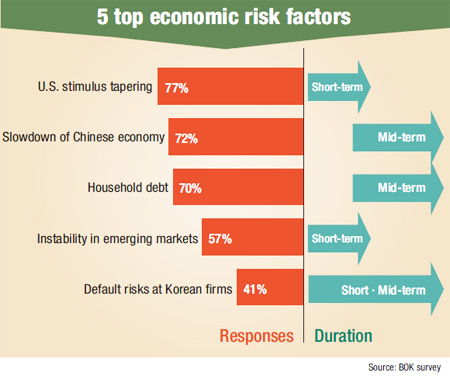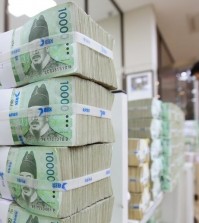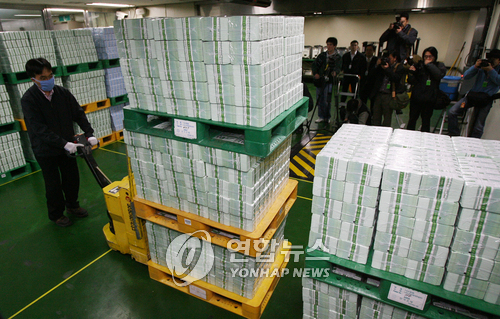- California Assembly OKs highest minimum wage in nation
- S. Korea unveils first graphic cigarette warnings
- US joins with South Korea, Japan in bid to deter North Korea
- LPGA golfer Chun In-gee finally back in action
- S. Korea won’t be top seed in final World Cup qualification round
- US men’s soccer misses 2nd straight Olympics
- US back on track in qualifying with 4-0 win over Guatemala
- High-intensity workout injuries spawn cottage industry
- CDC expands range of Zika mosquitoes into parts of Northeast
- Who knew? ‘The Walking Dead’ is helping families connect
U.S. tapering single biggest threat to Korean economy
By Na Jeong-ju
Financial market participants believe U.S. stimulus tapering is the biggest factor threatening the Korean economy, according to a survey conducted by the Bank of Korea (BOK).
Other risk factors include the slowdown of the Chinese economy, mounting household debt, financial market instability in emerging economies and rising credit default risks in Korean firms.
The bank conducted the survey on 90 risk management officials and fund managers from 77 financial services firms both at home and abroad, including banks and asset management firms.
About 77 percent of the respondents picked the adverse effects from the U.S. tapering as a possible downside factor that can cause “systemic” risks for the Korean economy.
The slowing economic growth in China was chosen by 72 percent, followed by a rapid growth of household debt (70 percent), the financial market volatility in emerging countries (57 percent) and the rising debt-to-income ratios among Korean firms (41 percent).
However, about a half of those surveyed said that Korea is unlikely to suffer from a financial crisis within a year. Only 16 percent think a crisis may hit the Korean financial market within a year.
The respondents based overseas were more optimistic about Korea’s financial market than those living here. About 94 percent of those based overseas ruled out the possibility that a financial crisis will occur in Korea within a year.
The poll also showed that market participants have more confidence in the Korean financial system than in the past.
In 2012, pessimists outnumbered optimists _ only 32 percent said a financial crisis won’t hit Korea within a year, while 33 percent said there will be no crisis in Korea.
“Despite some external risks, more investors and market participants are betting on Korea’s economic fundamentals and risk management systems,” said a BOK official. “What’s encouraging is that the Korean financial market is viewed more positively by those in foreign countries than by those in Korea.”
About 42 percent of those surveyed said the degree of their confidence in Korea’s financial system is “high,” while 8 percent said they have “low” confidence in Korea. In the previous survey, 16 percent said their confidence in the Korean financial system was low.
The survey results reflect growing investor confidence in the Korean economy despite lingering concerns about external negatives centered on Washington’s planned tapering of its monetary stimulus.
Industrial output is picking up while export growth remains strong. The BOK said earlier this month that economic recovery will pick up in the latter half of this year, citing a positive outlook for the global economy and the government’s stimulus plans.
This is in stark contrast to financial market instability in some emerging countries, such as India and Indonesia, where local currencies and stock prices have plunged amid fears over the U.S. fiscal exit policy.
Some experts caution that the slowing Chinese economy may raise uncertainties for Korea’s recovery. China is Korea’s largest trading partner.
“We don’t expect exports to China to drop drastically because external conditions are improving. However, China’s economic slowdown will remain as a major downside risk,” a BOK official said.
Alarm bells are also ringing louder for the rapid growth of household debt.
The country’s household debt soared to a record high of 1.02 quadrillion won as of January, according to the BOK. The ratio of debt held by Korean households to their disposable income has soared from 122 percent in 2004 to 137 percent in 2006, 154 percent in 2009 and 163.8 percent in 2012.















